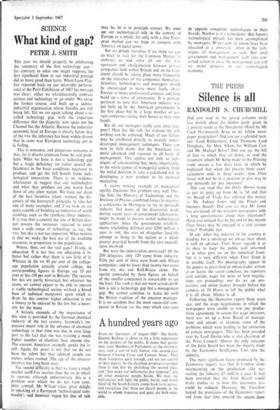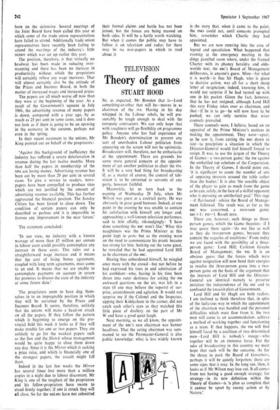Silence is all
THE PRESS RANDOLPH S. CHURCHILL
Did you read in the gossip columns early last month about the dinner party given in a private room at the Dorchester Hotel by Mr Cecil Harmsworth King to his fellow news- paper proprietors? Did you see a splendid turn- out—Lord Rothermere, Lord Thomson, Lord Drogheda, Sir Max Aiken, Sir William Carr and Mr Michael Berry? Did you see the bill
of fare 'to which they sat down, or read the
statement which Mr King made to the Printing trade unions a few days later, in which he
explained that when the present three years' agreement ends in three weeks' time Fleet Street will not be in a position to give way to any demands for pay increases? Did you read that the Daily Mirror wants to put its price up from 4d to 5d and that
the Board of Trade has referred this matter
to Mr Aubrey Jones and the Prices and - Incomes Board? Did you see that Mr Jones has circulated all the national newspapers with a long questionnaire about their intentions? Have you noticed that by the end of this month Fleet Street may be engaged in a very serious strike? Probably not.
If any other big industry in the country is heading for a smash-up we always hear about it well in advance. Fleet Street regards it as
its duty to keep the public well informed as to what goes on on the industrial front;
but it is very different when Fleet Street is in trouble itself. No photographs appear in the papers as press lord or union leader arrives at or leaves the secret conclave; no reporters wait outside, eager for news of how negotia- tions are proceeding: nor do we see pro-
prietors and union leaders brought before the cameras of 24 Hours to tell the public what it is all about. Silence is all.
Following the Shawcross report three years ago, and the wage negotiations in which the newspapers were unable to win any produc- tivity agreements in return for wage increases, there was set up a Joint Board of manage- ment and unions to examine some of the problems which were leading to the extinction of certain newspapers. This has been presided
over by Lord Devlin who is also chairman of the Press Council. Almost the only outcome of the Joint Board has been the inquiry made by the Economist Intelligence Unit into the industry.
The most significant figure produced by the Economist inquiry was that in London alone overmanning on the production side was costing the industry £5 million a year. It had been intended that the Joint Board would make studies as to how this enormous loss could be, reduced. However, the Guardian leaked the provisions of the Economist report and from that time onward the unions have been on the defensive. Several meetings of the Joint Board have been called this year at which some of the trade union representatives have failed to attend. Additionally trade union representatives have recently been failing to attend the meetings of the industry's little NEDDY which was set up earlier this year.
The position, therefore, is that virtually no headway has been made in reducing over- manning and there has been no increase in productivity without which the proprietors will certainly refuse any wage increases. That will almost certainly also be the attitude of the Prices and Incomes Board, in both the matter of increased wages and increased prices.
The papers are all much worse off now than they were at the beginning of the year. As a result of the Government's squeeze in July 1966, the advertising revenue of many papers is down, compared with a year ago, by as much as 25 per cent in some cases, and it does not look as if there is going to be an upswing in the economy in the autumn, perhaps not even in the spring.
In their recent statement to the unions, Mr King pointed out on behalf of the proprietors:
`Against this background of inefficiency the industry has suffered a severe deterioration in revenue during the last twelve months. More than half the papers in membership of the NPA are losing money. Advertising revenue has been cut by more than 20 per cent in several cases. To give a service to readers, news- papers have been compelled to produce sizes which are not justified by the amount of advertising revenue available. This has further aggravated the financial position. The Sunday Citizen has been forced to close down. The condition of certain papers can only be described as parlous and it is impossible to foresee any improvement in the near future.'
The statement concluded: `In our view, no industry with a known wastage of more than £5 million per annum in labour costs could possibly contemplate any increase in those costs. This rules out a straightforward wage increase and it means that the cost of living bonus agreement, coupled with long term agreements, must come to an end. It means that we are unable to contemplate payments on account in return for promises to discuss the state of the industry at some future date.'
The proprietors seem to have dug them- selves in to an impregnable position in which they will be sustained by the Prices and Incomes Board. It seems, therefore, unlikely that the unions will make a head-on attack on all the papers. If they follow the pattern which is beginning to emerge on the pro- vincial field this week it looks as if they will make trouble for one or two papers. They are unlikely to go for the weakest papers such as the Sun and the Sketch whose management would be quite happy to close them down any day. Since it is the Mirror which is seeking a price raise, and which is financially one of the strongest papers, the assault might fall there.
Indeed in the last few weeks the Mirror has several times lost more than a million copies in a night due to labour discontent. Mr King is one of the toughest of the proprietors and his fellow-proprietors have sworn to stand firmly together; if one is struck they will all close. So far the unilns have not submitted their formal claims and battle has not been joined, but the forces are being massed on both sides. It will be a battle worth watching. But when it comes the public may have to follow it on television and radio; for there may be no newspapers in which to read about it.































 Previous page
Previous page